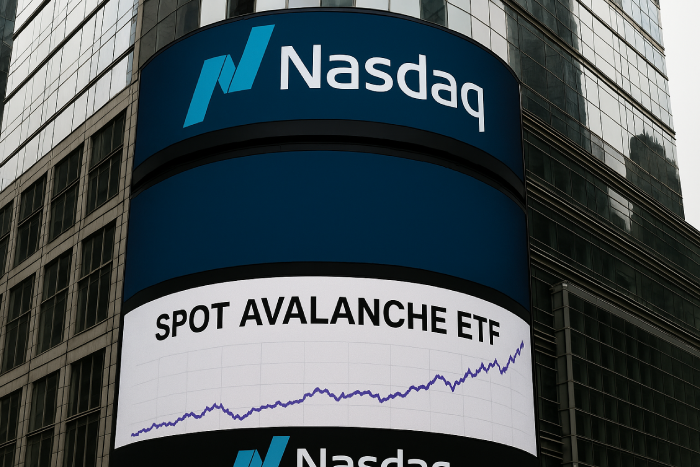Nasdaq has filed with the U.S. Securities and Exchange Commission (SEC) to list Grayscale Investments’ spot Avalanche exchange-traded fund, seeking approval to convert the Grayscale Avalanche Trust into a publicly traded ETF. The filing, submitted on March 27, requests a rule change to list the trust, originally launched in August 2024 as a close-ended fund.
The move marks an expansion of Grayscale’s push to transition more of its crypto investment vehicles into exchange-traded products. The firm stated on its website that its “SEC-reporting Products present a strong case for uplisting when permitted by the U.S. regulatory environment.” Grayscale emphasized that the ETF structure would allow the product to track its underlying assets more closely, due to the arbitrage mechanism inherent to ETFs.
The Grayscale Avalanche Trust currently holds $1,760,875.35 in assets under management. Each share represents 0.49256798 AVAX, with a net asset value (NAV) of $10.86 as of March 27. The underlying AVAX price stood at $10.11, implying a 7.4 percent premium on the trust’s market price relative to its NAV.
The trust uses the CoinDesk Avalanche Reference Rate as its benchmark index, providing a U.S. dollar-denominated spot price for AVAX by aggregating real-time data from multiple trading platforms. The fund carries a 2.5 percent management fee and does not distribute dividends.
Grayscale’s Broader ETF Conversion Strategy
The proposed Avalanche ETF follows a pattern of similar conversions and filings by Grayscale. The firm has applied to convert its Litecoin Trust into an ETF and submitted a spot ETF filing for Cardano. It is also awaiting regulatory approval for its XRP spot ETF.
Grayscale recently completed the conversion of its Ethereum and Bitcoin close-ended funds into spot ETFs. In addition, the company launched two new lower-fee products in 2024: the Grayscale Bitcoin Mini Trust and the Grayscale Ether Mini Trust. These spinoff products were designed to offer more cost-effective exposure to the underlying digital assets.
Despite these launches, the Grayscale Bitcoin Trust (GBTC) has experienced significant capital outflows. As of the end of 2024, the product had seen over $21 billion withdrawn since its conversion to an ETF on January 11, 2024, making it the only U.S.-based Bitcoin ETF with a negative investment flow at the time.
Fee structures remain a competitive factor across Grayscale’s products. GBTC has the highest management fee at 1.5 percent annually. In contrast, the Grayscale Bitcoin Mini Trust charges 0.15 percent. Grayscale’s Ethereum-based offerings show a similar trend, with newer, lower-fee products introduced to counter competition that has largely capped fees at 0.25 percent.





